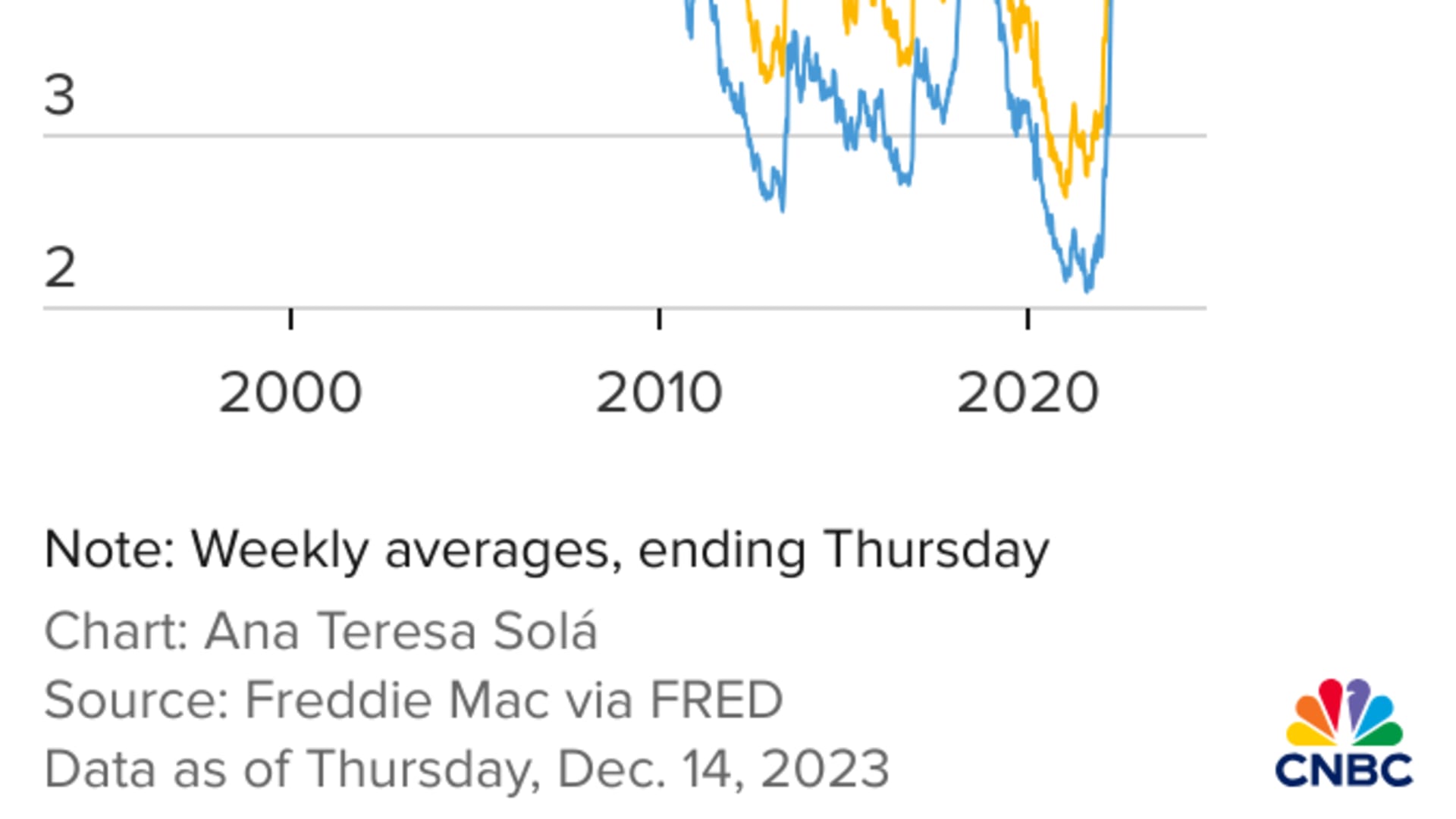
- After a year full of record-high interest rates and home prices, experts say there are signs of improvement for the housing market in 2024.
- In December, the average mortgage rates dropped below 7% for the first time since August and after an 8% peak in October, which pushed housing costs to the highest level since 2000.
- "The decline poses good news for buyers," said Jessica Lautz, deputy chief and vice president of research at the National Association of Realtors.
After a year full of record-high interest rates and home prices, experts say there are signs of improvement for the housing market in 2024.
In December, the average mortgage rates dropped below 7% for the first time since August and after an 8% peak in October, which pushed housing costs to the highest level since 2000.
The average rate on a 30-year fixed rate mortgage dropped to 6.95% from 7.03% last week, mortgage buyer Freddie Mac said Thursday. A year ago, the rate averaged 6.31%. Meanwhile, the 15-year fixed rate mortgage jumped to 6.38% from 6.29%.
Get New England news, weather forecasts and entertainment stories to your inbox. Sign up for NECN newsletters.
"The decline poses good news for buyers," said Jessica Lautz, deputy chief and vice president of research at the National Association of Realtors.

Interest and mortgage rates will slowly decline, giving people a "little bit more room in their budgets" when it comes to mortgage payments, experts say. Additionally, inventory is growing as new listings creep back up, said Nicole Bachaud, a senior economist at housing site Zillow.
Money Report
Lower interest rates should come as encouraging news for homebuilders.
"It should be easier for builders as rates go down, as they need to borrow to build," said Lautz. Homebuyers should see a greater supply as more homes will be built, she said.
However, consumers may still feel discouraged, added Lautz, as affordability may still be a challenge.
"We're expecting home price appreciation to stay flat for the next year nationally, so prices aren't really going to move much from where they're at now," Bachaud said.
More from Personal Finance:
Gen Z, millennials are 'house hacking' to become homeowners
Homeowners associations can be a boon, or bust, for buyers
Homebuyers must earn over $400,000 to afford a home
High costs kept would-be buyers as renters
Homes were 52% more expensive than rentals this year, the highest gap on record, according to the Zumper Annual Rent Report for 2023.
High costs in the buying market have delayed homeownership for many buyers and kept inflation-strapped consumers in the rental market, some explained.
The national rent price for a one-bedroom apartment is $1,496, down 10% from a year ago. The last time there was a decline was during the pandemic, from July to October 2020, Zumper found.
"Over the course of the last few years, there were actually a lot of buildings in the rental sector, so that may have helped to alleviate rental prices. But they're still at a high price point," Lautz said.
Lautz expects more movement in the rental market next year as many young adults look for a place to live.
While most young adults either stayed with parents or paired up with roommates during the pandemic to relieve costs, they might seek independence next year, whether because "a CEO [is] saying you have to come back into the office or they're ready to move out," said Lautz.
New York City is seeing a surging demand for rental housing in commutable areas with easy access to downtown and midtown Manhattan in 2024, according to data from StreetEasy, Zillow Group's New York City real estate marketplace.
"That's an indication that people are looking to move back closer to the workplace or closer to more amenities," Bachaud said. "We're expecting the rest of the country to follow that trend throughout the next year."
Record-high interest rates deterred more than 69% of renters from buying a home in 2023, a Zumper report found. These high costs are pushing the typical ages of renters and first-time homeowners upward.
To that point, the typical head of household in a rental is 41 years old, up from age 40 in 2019 and age 37 in 2000, according to Zillow economist Bachaud.
"Renters are getting older," said Bachaud. "As long as affordability remains a big challenge, we will likely see renters getting older."
Meanwhile, the age of a typical first-time homebuyer is 35 years. In the 1980s, people bought their first homes at the age of 28, Lautz said.
Market conditions and external factors, such as student loan repayments and child care costs, are delaying homebuying activity for many shoppers, Lautz said.
Since many people cannot afford to buy a home, they are likely to consider renting a single-family home instead to achieve a similar experience.
Renting over buying their first home
Prices for single-family rentals are increasing faster than rent prices for multifamily apartment buildings, showing signs of high demand, said Bachaud.
"That has a lot to do with affordability as people are priced out of being able to purchase a home. They're still looking for that starter home experience," she said.
As long as people continue to be priced out of the market, would-be homebuyers will remain as renters, and Bachaud expects "to see more of that this year."
Even though affordability is expected to marginally improve over the next 12 months as rates continue to decline, the market is still far from where it was before the pandemic, she added.
"Affordability is still a big challenge for a lot of households," she said.
'The American Dream is still owning a home'
While homeownership is challenging for many would-be buyers, it doesn't mean people no longer aspire to own a home, said Bachaud.
"The American Dream is still owning a home," she said. "There's a lot of pent-up demand for ownership; that isn't going to go away. It might take longer for people to get and to be able to realize that dream."
Indeed, "homeownership is the number one way to build wealth in America," said Lautz.
Lautz explained that when you look at the typical homeowner, they have a net worth of just under $400,000 compared with the typical renter, who has just over $10,000, following the American dream of financial stability.
"Folks will have to look elsewhere if they're not looking at homeownership to find that," Lautz added.
Additionally, younger generations are still thinking about saving for down payments and planning for future housing, said Bachaud, meaning the demand for homeownership persists.
She predicts a change in what homeownership will look like in the coming decades: "We're kind of on that journey now."
For now, serious first-time homebuyers should consider jumping into the market as soon as February, while the market remains quiet, said Lautz. Lower rates may breed competitive bidding wars among strong buyers, so now may be the time.
The National Association of Realtors forecasts mortgage interest rates will average 6.3% and estimates 0.9% increase for home prices in 2024, added Lautz.
"First-time buyers stand a chance at this time period," she said. "It's a trade off: Do they want to run the risk of encountering higher competition when rates are lower or do they want to increase the probability of securing homeownership?"
"Refinancing is always an option," she said.






